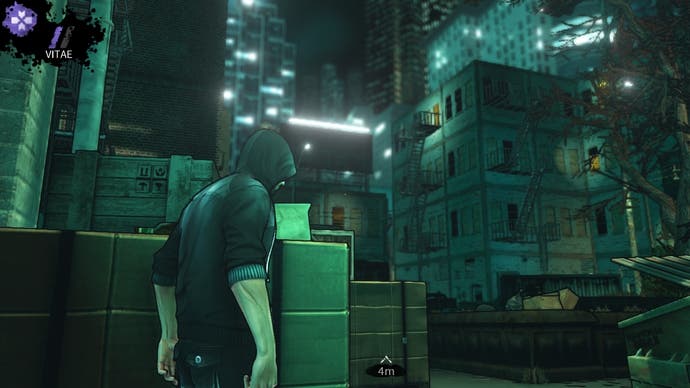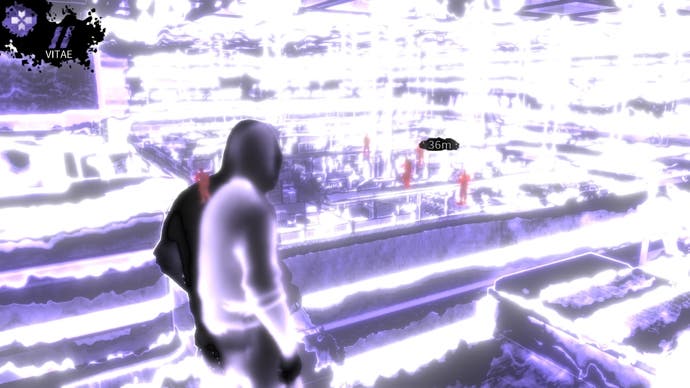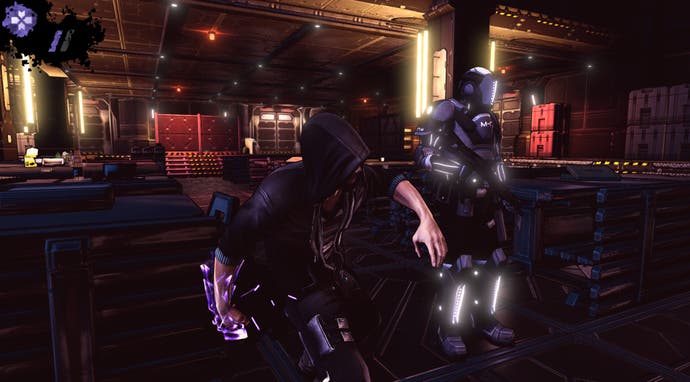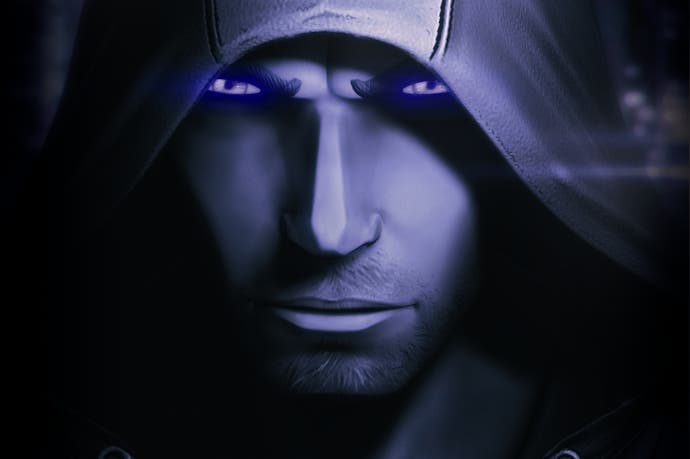Dark review
Vampire weakened.
Stealth is hard. Getting it right in a game means more than just creating really cool neck-snapping animations. It requires compelling AI that can at least pass for realistic within the confines of the game's rules. It requires precise movement and a well-balanced skillset, enabling the player to feel both vulnerable and powerful. And it requires something less tangible: the ability to create a feeling of spatial awareness in a virtual environment, simulating sensory information in a way that feels instinctive.
Yep, stealth is hard. Dark, meanwhile, is cheap, and one does not complement the other. Dark flounders on all fronts when it comes to stealth, and there's literally nothing else to the game besides that. Even with gameplay that is pared back to the absolute minimum, quality stealth remains out of developer Realmforge's reach.
You're playing as Eric Bane, a man who we first meet blundering around a nightclub plagued by visions of angels. Your first order of business is to find someone who can explain what has happened to you. Simple answer: you're a vampire, or least halfway to being one. To complete the process and avoid becoming a mindless ghoul, you need to drink the blood of the vampire who sired you. Since they're AWOL, you turn to the trendy bloodsucking clique at the Sanctuary club to find an alternate donor. This leads into six story chapters in which you creep and chomp your way through a variety of locations on the trail of super-vampires who might provide the sanguine solution to your problem.

Movement is twitchy and vague, but also weirdly restricted. You are, apparently, the least agile vampire ever. If you're on a balcony above someone, you can't simply vault a railing and drop down on them. You can't even jump - your feet are glued to the floor, reducing every area to the level of a crude Pac-Man maze. This forces you to rely on Shadow Leap, a rudimentary teleport ability, to navigate the stages. It's a sloppy system, though - needlessly fussy in where it lets you jump to - and one that is practically unusable under pressure.
Combat is similarly claustrophobic. You have no physical attack moves, or at least none that can be deployed at will. All you can do is sneak up behind someone and press a button to clobber them with an instant-kill strike, or hold it down to feast on their blood. Even when the enemy is alerted to your presence, you can't take a swing at them. You have to shuffle and wrestle with the camera for the attack prompt to show up, and only then can you take them down.
Expanding your arsenal somewhat is a suite of vampire powers, some passive, most activated by a selection wheel or d-pad shortcuts. You can teleport and instantly kill a target, for example, or use shadowy powers to make someone drop dead from a distance. You can also bamboozle enemies, leaving them dazed, open to attack or blind to your presence.
It's here that Dark comes closest to offering a fully featured toybox to play with. Each power uses up Vitae, a finite resource that can only be replenished by feeding on an enemy. Even when maxed out, you only have enough Vitae slots for four uses of your powers, so there's a sliver of strategy involved as you work out when to rely on your powers and when to take things slowly and restock.

Strategy requires intelligence, however, and that's in short supply. Enemies are ridiculously stupid and your best tactic is often simply to alert the guards, find a safe corner and wait for them to wander up to you, one at a time, obligingly walking straight into your one-hit-kill punches. Health recharges automatically, so it's possible to wipe out almost every enemy in a stage using this method. There are a couple of enemy types introduced later that require a little more effort, but not much. This is a game that features an actual screen prompt saying, "Some enemies don't move at all, but instead just stand there looking in one direction." It's a design feature, you see.
With nothing else in its gameplay arsenal, Dark quickly slips into a stultifying rhythm of leaden story sequences, which find you trudging between conversations in Sanctuary, and missions made up of room after room of basic sneak-and-slay gameplay. You'll slog through an area filled with guards, only to walk through a door into another virtually identical area with more perambulating action figures to outwit.
Inevitably, the game's challenge describes a ski slope rather than a rising curve. At the start, all you have are the ham-fisted controls and one-note combat, where progress comes through trial and error, and the patience needed to put up with the sloppy checkpoints. Level up a few key vampire powers, learn to spot the glaring gaps in the enemy AI, and the game becomes pathetically easy. Those six chapters run dry much faster than you think.

Within that, the presentation is often distractingly cheap, a sign of the game's presumably tiny budget. The visuals have opted for a broad, smeary cel-shaded look but character models wouldn't look out of place in 1995 and the animation is routinely terrible. Characters' mouths barely open when they speak, but since they're usually spouting wretched dialogue such as, "The throbbing in my head was pounding in my temples," it's best to just skip through the turgid story scenes as quickly as possible anyway.
It's easy enough to see what Dark was aiming for. It's the no-frills off-brand version of Dishonored, complete with seeing-through-walls superpowers and teleport-assisted traversal of environments, dressed up as True Blood fan fiction. In every aspect, however, it falls woefully short of its inspirations. It's a game defined by its limitations - of technology, of budget and of development skill.
Low-budget games can be delightful and surprising, but only if the core elements work. Here, they don't. In its best moments, this is only ever a reminder of better games. In its worst moments - of which there are far too many - Dark frustrates and irritates as only a clumsy stealth game can.

